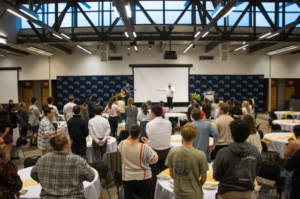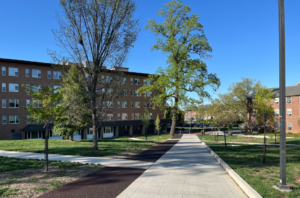The Virtue of Nationalism Lecture
By Nick Swanson
“The Virtue of Nationalism” was a conversation with Yoram Hazony about how nationalism can lead to “a revitalization of tolerance,” hosted by the university’s Institute for Human Ecology, last Thursday, October 11. More than 35 students, faculty and staff attended the event with Hazony, an Israeli philosopher, bible scholar and political theorist.
The talk, which centered on Hazony’s most recent book entitled The Virtue of Nationalism, focused on Hazony’s view that the world is governed best when society takes “a step towards nationalism, towards being able to recognize that the world is governed best when we allow others to do things differently from us even though we may disagree.”
Hazony was introduced by the discussion’s moderator Joe Capizzi, director of the Institute, as the President of the Herzl Institute — a group that promotes Judaism and the State of Israel through an emphasis on foundational Jewish ideas. Hazony has written three books and his columns frequently appear in the Wall Street Journal and National Review. He is a graduate of Princeton University where he received a B.A. in East Asian Studies and Rutgers University where he was awarded a Ph.D. in Political Theory.
Hazony began the conversation with a ten minute lecture outlining his book. He argued that the debate over nationalism should have taken place 30 years ago during the fall of the Soviet Union. He suggested that a global consensus formed back then that emphasized a new world order in which a single body of law and a single political structure would rule the world.
Interestingly, he compared this to the actualization of John Lennon’s song “Imagine.” Hazony said that he initially disregarded the song as something written by “some crackpot.” However, Hazony claimed that the song has become a reflection of the globalism that has emerged since the fall of the Soviet Union.
Hazony went on to explain in the wide-ranging discussion with Capizzi and Georgetown constitutional law professor Joe Hartmann that nationalism was scriptural — based on the books of the Old Testament. He claimed that nationalism would lead to a revitalization of tolerance, which he claimed had been lost in the United States and the West. Tolerance, he said, could be restored through a mutual understanding that people have different views and no nation should want to impose those views on every other nation. Indeed, he characterized the other view as being, “I know what the best way is; thus, I am going to impose it on the rest of the world.”
Hazony argued that the nature of freedom is “that nations get to choose their own course of action.” Furthermore, he stated that true political principles develop only through nationalist nations in which the goal is not to conquer the world and establish global rule.
When challenged by both Capizzi and Hartmann on “nationalism” as a dirty word, Hazony argued that the corruption of the word by some shouldn’t make it inoperable. He emphasized the religious foundation of his view of nationalism. He suggested that Biblical stories like the story of Abraham who goes off to live on mountaintop far far away show that nations ought to be able to determine their own path, even it they don’t disagree.
Making a distinction between hatred and nationalism, Hazony argued that many groups like Nazis labeled as nationalists were not nationalists at all but rather groups trying to promote a global view of taking over the world.
“A lot of times people do not explain why they have nationalism, and it was nice to hear a thorough intellectual explanation of why nationalism can be a good thing,” said freshmen student Gabriel Romito. Still, Romito struggled with Hazony’s use of religion to back it up.
Hazony concluded that there was a need for a serious debate on nationalism.
“It was certainly a discussion that needs to be had,” said Romito.








